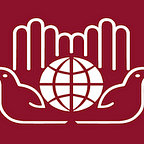Undergraduate Humanitarian Studies Student Spotlight: Josephine Cohen
Josephine Cohen is a third-year student at Fordham College at Rose Hill, double majoring in Humanitarian Studies and Environmental Studies. A familiar face to the institute, she also serves as the Secretary for the Humanitarian Student Union (HSU) at Rose Hill. Josephine initially enrolled in Fordham wanting to pursue International Studies and Environmental Studies. However, after meeting her fellow club members during her freshman year with HSU, she quickly realized that the Humanitarian Studies curriculum was more applicable to her desired career path. Through her coursework and her extracurricular involvement on campus, Josephine strives to impact the world positively.
Josephine is from Darlington, Maryland, a small town north of Baltimore near various state parks and the Chesapeake Bay. Growing up, Josephine was surrounded by nature, so environmental awareness and advocacy naturally became a part of her education. One day in high school, Josephine learned about issues that Indigenous people were facing in the United States from her anthropology teacher. As she wanted to know more, she traveled with her teacher to the Southern Cheyenne-Arapaho Reservation to conduct interviews for her Senior Capstone project. The trip was so significant that it prompted Josephine on a journey to understand how policy influences disadvantaged regions:
“This experience prompted me to learn more about Indigenous history in the United States, particularly in places where they have been erased from the historical and cultural narrative. Now I am studying Humanitarian Studies and Environmental Studies at Fordham, focusing largely on the effect of environmental and land rights issues on Indigenous people!”
As Josephine’s motives to pursue a humanitarian career became more evident, she traveled to other countries in Central and South America and became enthralled by the environmental sector of humanitarian studies. When asked if there was a pivotal moment that sparked her academic interests, she responded that it was a conversation with a man she met from the Dominican Republic. “He explained to me that, because of political corruption, there is little or no trash pickup service. As a result, people regularly litter.” She was taken aback by this forceful yet straightforward explanation as she realized the real impact that environmental policy change could have on a region.
If it wasn’t clear already, Josephine is committed to learning more about land rights and advocacy for Indigenous people in the U.S. and Latin America. Her research centers on the Trump administration’s decision to repeal the designation of Bears Ears National Monument, a sacred area of land that upholds Indigenous environmental systems and the history, culture, and traditions of the community. Besides her research on the Indigenous community, Josephine is also researching the rising issue of climate refugees in regions such as Kiribati and notes that this is one of the most pressing challenges associated with climate change. Josephine expressed her appreciation for having outstanding professors who allow her to adapt her work to fit her specific areas of interest in humanitarian studies, environmental policy, and sustainable development. One particular instance where she especially enjoyed researching was when she interviewed a visiting professor on extractivism and the Latin American New Left.
Critical thinking is essential to the humanitarian field for any position or title. Whether you’re traveling abroad or driving 15 min to work, one of the most important things as a humanitarian is to think about one’s actions and show empathy towards others. Josephine puts it best: “As the history of the humanitarian field has shown us, education and critique of our own work is the only way to make sure we are moving in the right direction as a collective.” She admires that her professors have never been afraid to point out mistakes in their work or the humanitarian sector’s flaws. In a field where your position could dramatically affect others’ well-being, it is essential to understand those people’s lives intimately and improve those communication methods.
Amidst the COVID-19 pandemic, Josephine is thankful to have a robust support system of professors and classmates and appreciates that people have been more empathetic to the stress caused by the pandemic. She finds it helpful to have an open line of communication with her professors, as it can be easy to grow detached from others given the nature of a virtual learning environment. Although it has been a challenge to adapt to the online courses, Josephine still finds inspiration from her peers in the Humanitarian Studies and Environmental Studies departments in addition to the different clubs on campus.
A final line of wisdom she shares with us is quoted by Bob Dylan: “Don’t criticize what you can’t understand.”
Written by Lena Rose, IIHA Marketing and Communications Intern
About the IIHA
The Institute of International Humanitarian Affairs (IIHA) prepares current and future aid workers with the knowledge and skills needed to respond effectively in times of humanitarian crisis and disaster. Our courses are borne of an interdisciplinary curriculum that combines academic theory with the practical experience of seasoned humanitarian professionals. The IIHA also publishes on a wide range of humanitarian topics and regularly hosts a number of events in the New York area, including the annual Humanitarian Design for Humanity Summit.
For more information or media inquiries, please contact: Camille Giacovas, Communications & Research Officer, cgiacovas@fordham.edu
